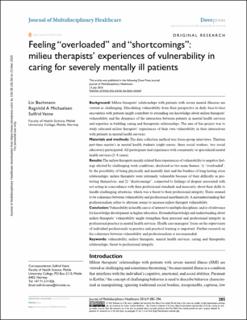| dc.contributor.author | Bachmann, Liv | |
| dc.contributor.author | Michaelsen, Ragnhild K A | |
| dc.contributor.author | Vatne, Solfrid | |
| dc.date.accessioned | 2023-02-13T13:48:10Z | |
| dc.date.available | 2023-02-13T13:48:10Z | |
| dc.date.created | 2016-07-14T13:51:34Z | |
| dc.date.issued | 2016 | |
| dc.identifier.citation | Journal of Multidisciplinary Healthcare. 2016, 9, 285-296. | en_US |
| dc.identifier.issn | 1178-2390 | |
| dc.identifier.uri | https://hdl.handle.net/11250/3050458 | |
| dc.description.abstract | Background: Milieu therapists’ relationships with patients with severe mental illnesses are viewed as challenging. Elucidating vulnerability from their perspective in daily face-to-face encounters with patients might contribute to extending our knowledge about milieu therapists’ vulnerability and the dynamics of the interaction between patients in mental health services and expertise in building caring and therapeutic relationships. The aim of this project was to study educated milieu therapists’ experiences of their own vulnerability in their interactions with patients in mental health services. Materials and methods: The data collection method was focus-group interviews. Thirteen part-time master’s in mental health students (eight nurses, three social workers, two social educators) participated. All participants had experience with community or specialized mental health services (2–8 years). Results: The milieu therapists mainly related their experiences of vulnerability to negative feelings elicited by challenging work conditions, disclosed as two main themes: 1) “overloaded”, by the possibility of being physically and mentally hurt and the burdens of long-lasting close relationships; milieu therapists were extremely vulnerable because of their difficulty in protecting themselves; and 2) “shortcomings”, connected to feelings of despair associated with not acting in concordance with their professional standards and insecurity about their skills to handle challenging situations, which was a threat to their professional integrity. There seemed to be coherence between vulnerability and professional inauthenticity. A misunderstanding that professionalism refers to altruism seems to increase milieu therapist vulnerability. Conclusion: Vulnerability in health care is of interest to multiple disciplines, and is of relevance for knowledge development in higher education. Extended knowledge and understanding about milieu therapists’ vulnerability might strengthen their personal and professional integrity in professional practice in mental health services. Health care managers’ focus on the supervision of individual professionals in practice and practical training is important. Further research on the coherence between vulnerability and professionalism is recommended. Keywords: vulnerability, milieu therapists, mental health services, caring and therapeutic relationships, threat to professional integrity | en_US |
| dc.language.iso | eng | en_US |
| dc.relation.uri | https://www.dovepress.com/getfile.php?fileID=31346 | |
| dc.rights | Navngivelse 4.0 Internasjonal | * |
| dc.rights.uri | http://creativecommons.org/licenses/by/4.0/deed.no | * |
| dc.title | Feeling “overloaded” and “shortcomings” : milieu therapists’ experiences of vulnerability in caring for severely mentally ill patients | en_US |
| dc.type | Peer reviewed | en_US |
| dc.type | Journal article | en_US |
| dc.description.version | publishedVersion | en_US |
| dc.source.pagenumber | 285-296 | en_US |
| dc.source.volume | 9 | en_US |
| dc.source.journal | Journal of Multidisciplinary Healthcare | en_US |
| dc.identifier.doi | 10.2147/JMDH.S106310 | |
| dc.identifier.cristin | 1368052 | |
| cristin.ispublished | true | |
| cristin.fulltext | original | |
| cristin.qualitycode | 1 | |

